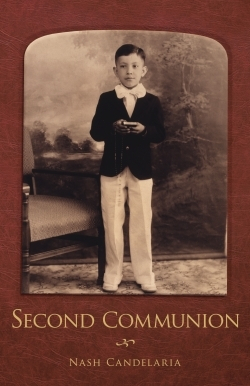Second Communion
Becoming an author is often serendipitous and circuitous, and for Nash Candelaria, one of Chicano literature’s prominent novelists, tracing his discovery of writing quickly led to the realization that it was “something that sneaked up” while he was “looking the other way.” From Albuquerque to Los Angeles, early influences to self-published debut, he threads anecdotal, leisurely reflections on childhood and adolescence (tinged with indelible accounts of the era’s prejudices) with memories of his collegiate years and beyond. Second Communion—a chronological career memoir on its surface, but also a reserved exploration of family tensions and the awakening to possibility—will especially intrigue readers of his earlier work.
Best known for his fictional quartet on the Rafa family (Memories of the Alhambra, Not By the Sword—winner of an American Book Award—Inheritance of Strangers, and Leonor Park), Candelaria is a descendant of one of New Mexico’s founding families. Though he does not detail these origins (opting instead to include an addendum at the end), curiosity about his ancestry serves as a subtle backdrop until it emerges as a fount for creativity. Early chapters focus primarily on relatives; education; the years preceding and including World War II; his ROTC involvement; and his increasing displacement in premed studies. Later chapters chronicle his enlistment during the Korean War and subsequent training in Faulkner country; meeting his wife, starting a family, and penning what would become his first published work.
Hindsight allows Candelaria to draw parallels between seemingly unrelated subjects, including running and writing. About both, he declares, “You have to contend with hard work, discipline, pain, and losing (rejection). But if it’s important, you’ll keep on keeping on.” Candelaria was forty-nine when Memories of the Alhambra appeared.
Second Communion occasionally lingers over certain periods in the author’s life (such as high school) while abbreviating others (little is said of his later novels), but if the pacing shifts and telescopes, drawing us closer or keeping us back, it is a memoirist’s privilege to disclose only the essentials. The end result gracefully attests to the value of remaining open to change, and perhaps most importantly, of accepting all that a nonlinear path can bring.
Reviewed by
Karen Rigby
Disclosure: This article is not an endorsement, but a review. The publisher of this book provided free copies of the book and paid a small fee to have their book reviewed by a professional reviewer. Foreword Reviews and Clarion Reviews make no guarantee that the publisher will receive a positive review. Foreword Magazine, Inc. is disclosing this in accordance with the Federal Trade Commission’s 16 CFR, Part 255.

